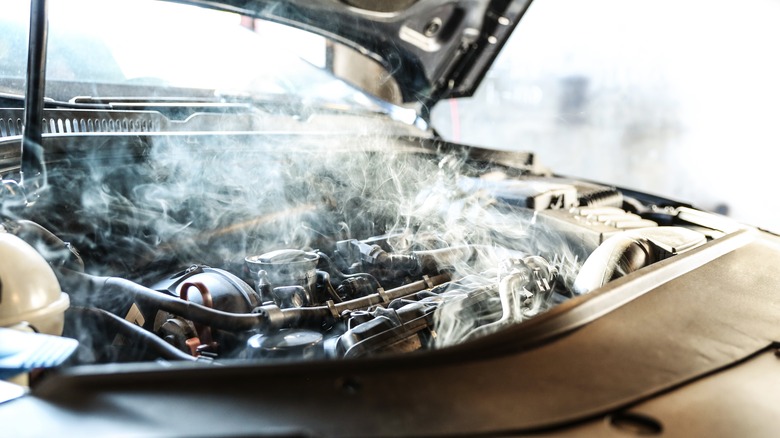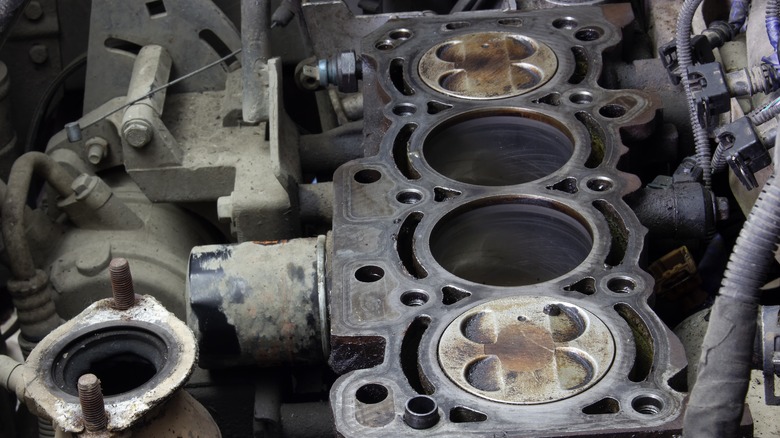P0303 Engine Code: What This Diagnostic Trouble Reading Means & How To Fix It
If you've ever seen a port by your car's dashboard that can't charge your phone or provide auxiliary power from your vehicle's battery, there's a good chance that it is an OBD (On-Board Diagnostics) port. You can plug a handheld OBD2 scanner into this port to quickly read information from your vehicle's computer, which can provide invaluable insight about the state of your engine and other components of your vehicle. An OBD2 scanner is relatively affordable, and can save you a lot of money by enabling you to skip a trip to the mechanic and identify problems such as why your Check Engine Light is illuminated.
Of course, you'll need to know how to interpret the information presented by your OBD2 scanner. For example, you may get a P0303 error code, with no other details about what this may mean. A P0303 code on your OBD2 scanner is identifying an issue with your powertrain — and more specifically, the third cylinder. You don't necessarily need a code reader or know how to use an OBD2 scanner to diagnose this issue. Instead, if you notice a few specific difficulties with your car, they could be pointing toward a problem with one of your cylinders. Your vehicle may hesitate or jerk as you accelerate, or you may notice that your engine is stalling, has less power, is idling roughly, has less fuel economy than usual, or other performance issues.
If your OBD2 scanner is displaying a P0303 trouble reading and/or you notice your car struggling with these symptoms, you're going to need to fix the issue. You're also going to want to know what caused it in the first place, in order to prevent it from happening again.
What can cause a P0303 Engine Code?
Since a P0303 Engine Code signifies a problem with your third cylinder (likely it is misfiring), there are several different reasons that this could be happening. In fact, it may not be the cylinder itself, but another component of your vehicle that is leading to the misfire. This includes parts of your ignition system, such as a worn or malfunctioning spark plug, failed coil pack, or coil-on-plug coil. If your vehicle uses spark plug wires, it could also be a problem with one or more of these.
Additionally, the issue may stem from a problem with your engine, such as damage to your cylinder walls or to one or more of your pistons, a damaged lifter, or a worn camshaft lobe or worn piston ring. A leaky valve or head gasket could also be the culprit. A problem with your fuel delivery system could also cause a P0303 trouble reading, such as a malfunctioning fuel injector or damaged wires or loose connections within your fuel injector circuit. A damaged injector driver or some other issue with your powertrain control module may also be the reason.
Whatever the cause, you'll want to fix the problem as soon as possible — not just to eliminate the P0303 Engine Code and your Check Engine Light, but for your own safety and to prevent further damage to your engine or your vehicle.
Troubleshooting and fixing the P0303 code
Of course, the fix for your P0303 trouble reading will depend on which of the above reasons is causing it. Some will likely require taking your vehicle to a body shop and paying a professional mechanic to repair the damage causing the code. If you don't know what you're doing, you'll want someone who does fixing or replacing your injector driver or other major components of your powertrain, for example. At the very least, knowing the cause of the problem can save some time and possibly some money when you bring it into the shop and have to explain the issue. That's why — even before problems occur — you'll want to own an OBD2 scanner to diagnose any issues with your vehicle.
Smaller problems that may be causing the P0303 code can be taken care of in your own garage, however. If you know what you're doing, it isn't hard to tell if you have a bad spark plug and replace it yourself. If your engine is stumbling or hesitating and you have the P0303 code, you can quickly check if spark plugs, spark plug wires, or related components are the issue and fix the problem without having to go to the mechanic.
Plus, as with so many things in life, prevention can be the best medicine. If you perform routine maintenance and tune-ups on your vehicle, including checking on and changing out ignition components and other car parts that can wear over time, you're less likely to see them break down on you and cause issues such as ones that can trigger a P0303 Engine Code.


